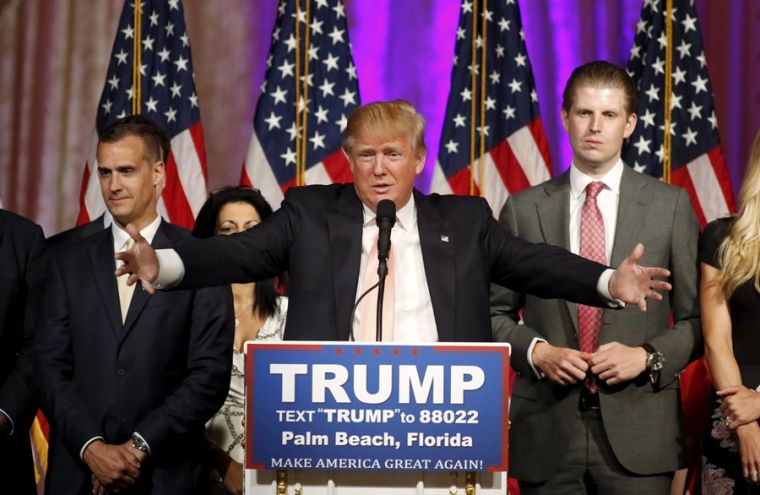Trump scores major wins in 5 primaries, but Kasich takes Ohio; Rubio suspends campaign after Florida debacle

Republican presidential front-runner Donald Trump defeated his rivals in five of six primaries held on Tuesday as he moved closer to securing his party's nomination, having officially scooped more than half of the required delegates.
Trump won over his three remaining rivals—Senators Ted Cruz and Marco Rubio and Ohio Gov. John Kasich—in North Carolina, Illinois, Northern Marianas Islands, Missouri and Florida, the state that offered the biggest prize of all with its 99 delegates all going to the winner, WND reported.
Even before vote counting was finished in Florida, Rubio announced that he was suspending his presidential campaign, according to NBC News.
"While we are on the right side, this year, we are not on the winning side," Rubio told supporters at rally near Miami.
Trump also squeaked past Cruz in Missouri, winning by .1 percentage point. With 100 percent of the polling precincts reporting, Trump got 40.8 percent of the votes to Cruz's 40.7 percent. Trump took 15 Republican delegates in the state.
However, Trump stumbled in Ohio, losing to Kasich in the latter's home state, 35.9 percent to the governor's 47.1 percent. As a result, Kasich grabbed all the 66 Republican delegates in the state.
Trump's biggest victory was in Florida where he handily defeated Rubio in his home turf, 45.8 percent to 27 percent.
Trump also clobbered his rivals in Illinois where he got 49 delegates courtesy of a 38.9 percent victory over Cruz, his nearest rival, who got 30.5 percent.
Trump took 29 delegates from North Carolina after winning with a 40.3 percent vote over Cruz's 36.8 percent.
Earlier, the GOP front-runner won 9 delegates in the Northern Marianas Islands, a U.S. commonwealth in the Pacific Ocean.
Trump now has a total of 661 delegates, according to the Associated Press tally as reported by the New York Times. He needs 576 more to collect the total of 1,237 delegates needed to secure the Republican presidential nomination.
Cruz now has 406 delegates, Rubio 169, and Kasich 142.
The next delegate-rich states are Arizona (58 delegates), Utah (40), Wisconsin (42) and New York (95).
Trump's failure to win in Ohio increased the possibility that Republicans could be headed for a potentially chaotic national convention in Cleveland in July, according to Bloomberg.
If he had won all 66 delegates of that state—which all went to Kasich—his total delegate count would have made Trump unstoppable, according to analysts.
Kasich, who secured his first victory after more than 20 states have held their primaries and caucuses, vowed to continue campaigning until the party's convention and beyond.

Clinton buries Sanders, winning in all 5 primaries
Meanwhile, Democratic presidential front-runner Hillary Clinton turned her sights to the general election and Trump after decisive wins over Sen. Bernie Sanders in Florida, Ohio and North Carolina and a close victory in Illinois and Missouri.
Clinton's victories on one of the most delegate-rich nights of the Democratic presidential contest had her supporters confident that she would emerge from the latest round of voting with a virtually insurmountable delegate lead over Sanders, Bloomberg reported.
As of early Wednesday, Clinton had 1,561 of the 2,383 delegates and super delegates needed to win, while Sanders had 800, Associated Press estimates showed.
The race next moves to March 22 primaries in Arizona and Utah for the Democrats and the Republicans, while the Democrats also have caucuses in Idaho on that day. After that, there are no big-state contests again on the Republican side until Wisconsin on April 5.
Seemingly moving past Sanders, Clinton used her victory speech to address a potential showdown with Trump in November.
"It's clearer than ever this may be one of the most consequential elections of our lifetimes," she said at a rally in West Palm Beach. "Our commander-in-chief has to be able to defend our country, not embarrass it; engage our allies, not alienate them; defeat our adversaries, not embolden them."
Explicitly targeting Trump, Clinton said the next president "has to bring our country together so we can all share in the promise of America."











